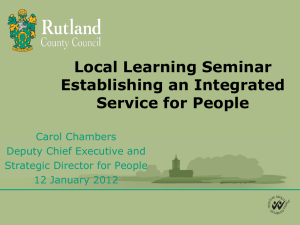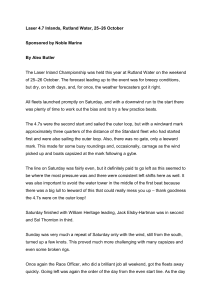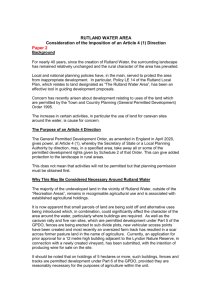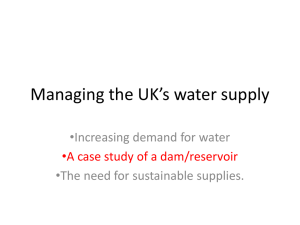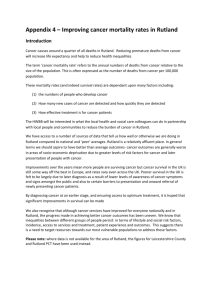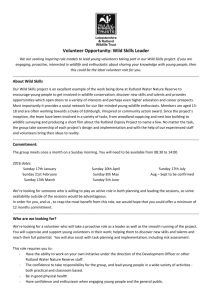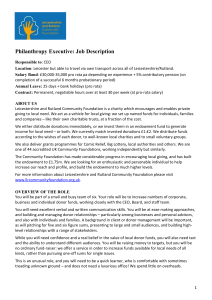The Rutland Centre - Houses of the Oireachtas
advertisement
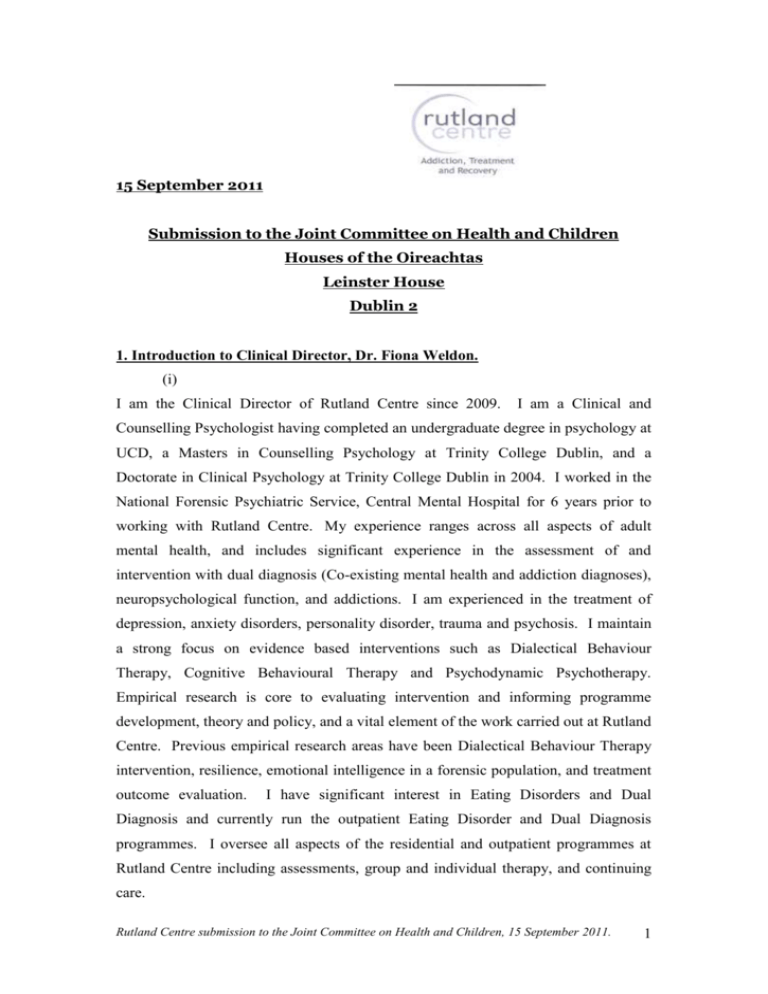
15 September 2011 Submission to the Joint Committee on Health and Children Houses of the Oireachtas Leinster House Dublin 2 1. Introduction to Clinical Director, Dr. Fiona Weldon. (i) I am the Clinical Director of Rutland Centre since 2009. I am a Clinical and Counselling Psychologist having completed an undergraduate degree in psychology at UCD, a Masters in Counselling Psychology at Trinity College Dublin, and a Doctorate in Clinical Psychology at Trinity College Dublin in 2004. I worked in the National Forensic Psychiatric Service, Central Mental Hospital for 6 years prior to working with Rutland Centre. My experience ranges across all aspects of adult mental health, and includes significant experience in the assessment of and intervention with dual diagnosis (Co-existing mental health and addiction diagnoses), neuropsychological function, and addictions. I am experienced in the treatment of depression, anxiety disorders, personality disorder, trauma and psychosis. I maintain a strong focus on evidence based interventions such as Dialectical Behaviour Therapy, Cognitive Behavioural Therapy and Psychodynamic Psychotherapy. Empirical research is core to evaluating intervention and informing programme development, theory and policy, and a vital element of the work carried out at Rutland Centre. Previous empirical research areas have been Dialectical Behaviour Therapy intervention, resilience, emotional intelligence in a forensic population, and treatment outcome evaluation. I have significant interest in Eating Disorders and Dual Diagnosis and currently run the outpatient Eating Disorder and Dual Diagnosis programmes. I oversee all aspects of the residential and outpatient programmes at Rutland Centre including assessments, group and individual therapy, and continuing care. Rutland Centre submission to the Joint Committee on Health and Children, 15 September 2011. 1 2. The Rutland Centre: History and Treatment Approach (i) Rutland Centre is a 25 bed Residential Treatment Centre for Addictions to Alcohol, Drugs, Compulsive Gambling, Sex Addiction and also Eating Disorders. It is situated in Knocklyon House, Knocklyon, Dublin 16. A founder member was Mary Banotti, ex TD and former MEP who joined the Board of Directors and served on the Board for many years. Rutland Centre is currently governed by a Board of Directors and Trustees and is a registered Charity. (ii) Rutland Centre holds an excellent reputation and is a leader in the field of Addiction Treatment since its foundation in 1978 by Raphael Short basing the programme on a leading treatment approach throughout the US-The Minnesota Model. The current treatment programme remains loosely based on the Minnesota Model, with a more integrated approach, including a focus on the therapeutic community model as a vehicle for change. Our programme of services is unique in that they are abstinence based, with a focus on client-centred treatment without the use of mood altering substances throughout residential treatment. (iii) We refer and liaise with detox facilities in order to support individuals in their preparation for treatment. We also provide weekly preparation groups to support individuals in becoming ready for residential treatment. Treatment is delivered by a multidisciplinary team of highly skilled professionals including addiction counsellors, psychotherapists, nurses, a GP, a consultant psychiatrist and clinical psychologists. Group and individual therapy, using interventions such as Cognitive Behavioural Therapy, Client-Centred work, Psychodynamic psychotherapy and structured written exercises form a basis for therapeutic change. A significant part of the recovery process involves the completion of a specific recovery and relapse prevention plan, tailored to the individual needs of the client. (iv) From its inception its ethos was to be a centre of excellence – available to both public and private clients and was for many years in receipt of a grant from the Health Board. Whilst the ethos of inclusivity continues, fewer public clients are receiving financial support in accessing the Centres services. Rutland Centre submission to the Joint Committee on Health and Children, 15 September 2011. 2 (v) For over 30 years Rutland has been at the forefront of maintaining high standards of excellence in its treatment and continues to innovate to meet the new and complex demands of the current population of individuals and families who encounter and live with addictions. Over 6000 individuals have completed a Rutland Centre Programme and many thousands of families have also benefited from Rutland Centre’s services. (vi) Rutland Centre is a unique treatment facility in terms of its focus on the family as a central component in the treatment and recovery of those addicted, and this approach has stood the test of time as our research will validate. Focusing on providing help, support, and education for families, the families are empowered to intervene and support their loved one and to repair fractured relationships, thus promoting a very supportive environment for recovery. (vii) Independent research carried out with the Rutland Centre in the past five years found that 79% of those addicted to alcohol and drugs were abstinent one year post completion of the residential and aftercare programme. Higher levels of quality of life were found in all participants who were abstinent at one year post completion of the programme. (viii) The centre continues to do ongoing research- and is innovative in introducing Dual Diagnosis Programmes to meet the needs of the complexity and overlap of Mental Health issues co-existing with Addiction. Our outpatient dual diagnosis treatment service has been developed to meet the needs of those who require evidence based psychological intervention, and clients may remain on pharmacological treatment during this programme. (ix) Summary of services at Rutland Centre The Rutland Centre offers a full range of services including the following: Assessment service Pre -treatment prep group Rutland Centre submission to the Joint Committee on Health and Children, 15 September 2011. 3 Five week residential programme incorporating group and individual therapy Family support and intervention groups Relapse prevention programme Continuing Care programme (at least one year) 10 week General Outpatient programme 12 week Dual Diagnosis outpatient programme (x) CHKS Accreditation The Rutland Centre is fully accredited with CHKS. On 2nd December 2009 the centre was awarded this full Accreditation by CHKS Healthcare Accreditation Standards. (xi) Current trends in drug use. Rutland Centre has witnessed significant changes in the presentations of those seeking help. In 2011 thus far 20% of all assessments were for illicit drug use, and 5% were for primary prescription drug addiction. There has been a significant rise in addiction to prescription medications as a primary addiction. When poly substance addiction is taken into account this figure rises significantly. Approximately a third of those addicted to alcohol are also abusing prescriptive medications. In many instances individuals are abusing or developing a problem with benzodiazepine and non benzodiazepine hypnotics. Benzodiazepines in conjunction with elicit substances are implicated in more deaths than any other drug (National Drugs Strategy 2009-2016). Of concern, many individuals are taking these medications for the treatment of anxiety or sleep problems, without ever having had access to psychological therapy for the treatment of these conditions in primary care. Rutland Centre is also seeing an increase in individuals with chronic pain conditions who have become psychological and physically dependent on their opiate pain medications (e.g. oxycontin). These trends signify a need to integrate pharmacological intervention with psychological treatments in order to minimise reliance on medication as a single primary intervention for psychologically treatable conditions. Primary care structures do not meet the needs of our mental health and multidisciplinary intervention and referral is required early in order to minimise the likelihood of addiction developing, or mental health conditions deteriorating. (xii) Rutland Centre submission to the Joint Committee on Health and Children, 15 September 2011. 4 In terms of illicit drug use, Rutland Centre is concerned greatly with the continued presentation of young males addicted to cannabis and in particular the stronger form of this, “skunk”. Skunk has 2-3 times greater the concentration of THC found in cannabis. In many cases these young males have experienced a psychotic episode including the development of paranoia, related to their cannabis use. The detoxification time for weed is significantly longer also. Rutland Centre is also concerned about the rise in young males addicted to Ketamine (tranquiliser used in veterinary practice) which has become widely available on the streets. (xiii) Rutland Centre has seen an increase in those presenting with complex needs as a result of polydrug use including alcohol. Cognitive impairment as a result of chronic drug or alcohol use requires assessment and treatment needs to be informed by this process. Underlying depression or anxiety conditions may be present before addiction, or may be as a result of addiction. However services should de developed that can address dual diagnosis conditions and treat them in an integrated care plan. The Rutland Centre provides in-depth psychological assessment and tailored intervention based on these needs. (xiv) Rutland Centre provides annual data to the Health Research Board and has provided input on training to the drugs task forces in inner city Dublin regarding opiate users and eating disorder. Increases have been noted in particular regarding females developing addiction to opiates, with an undiagnosed eating disorder. In many cases females are using the opiates to control their appetite, and anorexia is undiagnosed. 3. Challenges to accessing treatment Medical Card Holders (i) In 2005, the Rutland Centre treated 47 medical card holders. In 2009, the Rutland Centre treated 11 medical card holders. In 2011 thus far we have treated 0 medical card holders. The significant drop is extremely disheartening, given the following issues: Rutland Centre submission to the Joint Committee on Health and Children, 15 September 2011. 5 1. Rutland Centre is receiving on average 15 calls per week from medical card holders looking for treatment. Funding has become so difficult to secure that we are turning these people away rather than put them through a potentially traumatic emotional clinical assessment where there is little likelihood of treatment being funded. We are directing these individuals to the HSE. 2. A very small portion of those with substance use disorder are accessing residential treatment. The National Drugs strategy 2009-2016 recommends greater access to alternative treatment to methadone maintenance; however this remains the primary care pathway for an individual addicted to opiates. Rutland Centre would suggest that individuals would benefit from being offered an at earlier point, access to residential treatment as this early intervention would give greater rise to the likelihood of the person becoming abstinent from not just opiates but also other substances such as alcohol or cocaine, as many individuals are continuing to use these and other prescription medications whilst on methadone maintenance. 3. It is the view of Rutland Centre that the national drugs strategy would benefit from taking a broader understanding of addictive processes, in order to best develop interventions to treat addiction. Unfortunately addiction is more than using one substance, or even multiple substances, but reflects the individuals relationship with and dependence both physically and psychologically on substances. Physical addiction can often be broken, however it is the psychological dependency that maintains addiction once the physical detox is complete. Often without intervention that accounts for this, relapse happens almost immediately. The National Drugs Strategy 2009-2016 reported that between 2001 and 2006, “68,754 cases were treated for substance misuse, 54% of these received methadone treatment. In the same period, 7% accessed residential services” (Department of Community, Rural and Gaeltacht Affairs, 2009). Methadone treatment outcome research is flawed in reporting outcomes, often stating that individuals are “abstinent” in their outcome studies, however “abstinence” being defined as not using heroine. It is clear from the ROSIE report (2009) that in fact many of these individuals may be abstinent from heroine but are Rutland Centre submission to the Joint Committee on Health and Children, 15 September 2011. 6 continuing to use other substances such as alcohol, abusing prescription medication, or other illicit drugs such as cannabis or cocaine. It is clear that in many instances addiction is still very active, although the substances used may vary. Rutland Centre recommends that an approach to addiction that provides intervention for the addictive processes as a whole (and thereby improving quality of life for the person and family as a whole) is a vital starting point in policy and service development. 4. For example in the ROSIE report (NACD, 2009) opiate use reduced over three years from approx 75% to approximately 45% - however alcohol use at intake interviews was N=204, and at 3 year follow up this figure was N=157. “Daily consumption remained constant throughout the study period” (NACD, 2009) reporting the average daily consumption at 9.1 units of alcohol. This is significantly concerning in the context of addiction processes for two reasons: 1) alcohol raising risk of relapse to opiates and 2) highlighting the fact that in many cases the addictive processes are still evident, but the substance has just changed. Treating addiction to one substance and targeting services and intervention towards one substance is likely to be non effective, and outcomes will be deceptive and skewed. If treatment is targeting one substance, little else may change in terms of other substances, mental health and general well being of the person and family. 5. Funding is not currently available under the medical card scheme, for those individuals who are experiencing alcohol addiction. Given the inclusion of alcohol in the 2009 National Drugs Strategy it would be appropriate for funding to be ringfenced under the treatment pillar for those who are seeking intervention regarding alcohol addiction. 6. The Rutland Centre is proud to have provided treatment for 30 years across the social divides, which adds to the richness of the recovery environment. This is in accordance with the Vision for Change governmental policy that treatment access should be equitable, and inclusive, across the social divides. However due to the lack of funding, there is a risk that treatment would Rutland Centre submission to the Joint Committee on Health and Children, 15 September 2011. 7 become exclusive. We would like to see representation in treatment across the social divides continuing into the future. 4. Soilse-Rutland Partnership (i) As an innovative response to the Drug problem in North Inner City Dublin, the Soilse-Rutland public/private partnership programme is based on the continuum of care model and utilises a case management approach incorporating individual care plans. The North Inner City Drugs Task Force (NICDTF) selected the programme to be independently evaluated by Dr. Mark Morgan. The partnership programme was funded by the North Inner City Drugs Task Force (NICDTF) and commenced in operation in December 1997. Independent evaluation of the partnership programme found that it is a model of good practice and is effective as an intervention. A summary of that report is as follows: “The outcomes of the programme for participants in phase II are very positive. Nine of the ten are drug free and one is currently in relapse. They remain drug free, are fully engaged with employment and/or education, have independent accommodation, have not offended/re-offended, and in two cases the participants have had their families restored” (Dr. Morgan, 2001). (Full report available on www.drugsand alcohol.ie/5800/) (ii) The funding for this partnership has virtually disappeared, and is viewed as a huge loss in terms of its outcome success and effectiveness. The Rutland Centre requests that the Government ensures the future of this partnership by restoring funding. One person has been admitted in 2011 from the Soilse project. 5. Treatment Outcome Evaluation at Rutland Centre 2011: Rutland Centre submission to the Joint Committee on Health and Children, 15 September 2011. 8 Evidence for the effective treatment of Dual Diagnosis (Substance Use Disorder and Mental Health Diagnoses (i) The NACD (2004) reported that 60% of completed suicides in Ireland had substance use disorder, making the link between substance use and mental health very clear. The National Advisory Committee on Drugs (2004) found no systematic provision for those with dual diagnosis (those with substance use disorder and a co-existing mental health diagnosis. (Mental Health and addiction services and the management of dual diagnosis in Ireland, NACD, 2004). (ii) Mental Health and Rutland Centre – Evaluating Pre and Post treatment outcome. Rutland Centre treatment focuses on individual care planning, has specialist intervention for the treatment of dual diagnosis, and has evaluated the impact of treatment on mental health. (iii) Between January and September we have collected data on the effect treatment is having on Clinical Depression, Anxiety, Suicidal ideation and Self esteem. Below are summaries of this information. N is the total number for which a complete data set was obtained, on each clinical variable. Depression and Suicidal Ideation were measured using the Beck Depression Inventory (BDI-II), Anxiety was measured using the Beck Anxiety Inventory (BAI), and self esteem was measured using the Rosenberg assessment of self esteem. (iv) Table 1. below outlines some preliminary descriptive data on the mental health variables that were measured pre and post treatment. A significant positive treatment effect was found, on reducing clinical anxiety, suicidal ideation and clinical depression, as well as increasing self esteem. 25 clients admitted since January had suicidal ideation on admission, 3 of whom had stronger intent. On leaving treatment 7 clients reported experiencing passing suicidal ideation, but with no intent. Table 1. Rutland Centre submission to the Joint Committee on Health and Children, 15 September 2011. 9 Anxiety Depression Self Esteem Suicidality – N=61 N=61 N=50 ideation or intent N=25 (present pre treatment) Sig Reduction Sig Reduction Sig Increase N=7 clients had N=54 N=56 N=48 suicidal ideation (passive) no intent on leaving treatment) This research study is ongoing and data will be available in January regarding a one year follow up. Correlational analysis of the data is ongoing. Rutland Centre aims to publish this research next year. 6. Rutland Centre Continuing Care Summary 2010 (i) Total currently in aftercare (74%) Males: 18% relapsed and left the programme, 23% relapsed and rejoined the programme 8% left whose current status is unknown, 72% are currently actively engaged in Continuing Care. Females: 22% relapsed and left the programme, 22% relapsed and rejoined, 2% left whose current status is unknown, 75% are currently actively engaged in Continuing Care. Rutland Centre submission to the Joint Committee on Health and Children, 15 September 2011. 10 42% of males relapsed in the first year, and 56% of those rejoined the programme 45% of females relapsed in the first year, 50% of these rejoined the programme. 7. Cost/Benefit Analysis Cost of addiction related health problems to the Health Service Executive: (i) In 2008 the HSE reported that in a ten year period alcohol related illness accounted for 841,161 bednights in hospitals (HSE, Alcohol related harm in Ireland, 2008). (ii) Liver disease has increased by 190% between 1995 and 2007 (Morgan, McCormick, O’Hara, Smyth & Long, 2011). (iii) The cost of addiction to the Health Service annually has been estimated at 3 billion. However there is little funding available for detoxification and rehabilitation (residential or outpatient) by comparison. This makes little economic or social sense. It is estimated that the cost of methadone maintenance was 14 million in primary care in 2007 (Drug addiction, treatment and Rehabilitation, Comptroller and Auditor General, Department of Community, Rural and Gaeltacht Affairs, 2009). This does not include inpatient detoxification costs. There is currently no ringfenced funding for residential drug free treatment, rather virtually no funding in 2011 thus far. Considering the cost of methadone maintenance and the concerns about outcome considered from the ROSIE report, it is recommended that increased funding be allocated to residential services which target addiction, mental health and the person as a whole (not just one substance that can change). Those that enter residential treatment are unlikely to require multiple treatments, the majority only ever having treatment once. When this is compared with the multiple detoxifications that can be required (and associated cost) notwithstanding the cost of Rutland Centre submission to the Joint Committee on Health and Children, 15 September 2011. 11 methadone maintenance to our health system, it is clear that this approach is neither effective nor cost efficient. The multiple detoxifications that are often required whilst a person is on pharmacological replacement therapy is a significant indicator that the treatment of physical dependence is not sufficient to break the psychological pattern of addiction – and this is evidenced clearly in the ROSIE report where individuals are using alcohol or other illicit substances whilst on methadone. Whilst we recognise the value of methadone therapy in terms of stabilising, this is insufficient as an approach to longer term sobriety and recovery. Addiction treatment requires adequate psychoeducation on the process of addiction, significant family involvement, and evidence based psychological interventions to address the underlying issues that are often present. Residential treatment costs approximately €10,000 which includes a full year of continuing care support, not just for the individuals but also for the families. 8. Comments on National Drugs Strategy (Interim Report) 2009-2016 The National Drugs Strategy includes the following points: (i) A recommendation for access to treatment within one month of presentation. (ii) The main strategy for opiate users in methadone maintenance. The national drugs strategy 2009-2016 noted that the long term effects of methadone maintenance was a concern. (iii) The national drugs strategy recommended combining alcohol and drugs treatment services. (iv) Tier 3 and 4 were found to be underdeveloped with little provision for residential treatment. Rutland Centre submission to the Joint Committee on Health and Children, 15 September 2011. 12 (v) The policy focuses on providing an appropriate and timely intervention for substance use tailored to individual need. (vi) Alcohol is seen as a gateway to illicit drug use (polydrug use is the norm among illicit drug users). (vii) At the end of March 2009 the Government agreed to include alcohol in the National Substance Misuse Strategy. (viii) A focus on the provision of easily accessible and affordable treatment services for people with alcohol and drug related disorders. (ix) A recommendation that options other than methadone maintenance be developed for opiate users including increased access to residential treatment (only 7% of those offered methadone maintenance were offered residential treatment). (x) Methadone treatment outcome research is flawed in reporting outcomes, often stating that individuals are “abstinent” in their outcome studies, however “abstinence” being defined as not using heroine. It is clear from the ROSIE report (2009) that in fact many of these individuals may be abstinent from heroine but are continuing to use other substances such as alcohol, abusing prescription medication, or other illicit drugs such as cannabis or cocaine. It is clear that in many instances addiction is still very active, although the substances used may vary. Rutland Centre recommends that an approach to addiction that provides intervention for the addictive processes as a whole (and thereby improving quality of life for the person and family as a whole) is a vital starting point in policy and service development. (xi) Rutland Centre submission to the Joint Committee on Health and Children, 15 September 2011. 13 The National Advisory Committee on Drugs (2004) found no systematic provision for those with dual diagnosis (those with substance use disorder and a co-existing mental health diagnosis. (Mental Health and addiction services and the management of dual diagnosis in Ireland, NACD, 2004). _____________________________________________________________________ Conclusion The Rutland Centre wishes to thank the Joint Committee for Health and Children for its consideration and time and we hope that these issues will be addressed in order to meet the identified gap between Governmental policy and treatment provision for medical card holders. To facilitate this, Rutland Centre requests that a commitment to ringfenced funding for residential treatment for medical card holders be made given that they achieve standards of excellence in clinical outcome and cost effectiveness. Testimonials of two medical card individuals who received treatment at Rutland Centre will follow __________________ Dr. Fiona Weldon B.A., Dip.Psych., MSc., D.Clin. Psych., BPS/PSI Clinical Director _________________ Mr. Barton Kilcoyne Chairman Rutland Centre submission to the Joint Committee on Health and Children, 15 September 2011. 14
